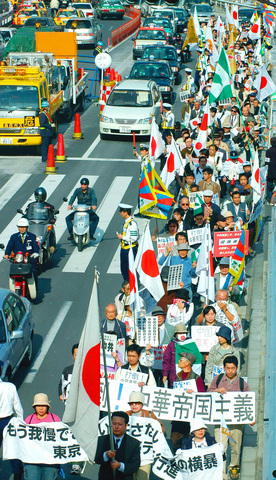Japanese Prime Minister Junichiro Koizumi and Chinese President Hu Jintao (
The meeting was to take place yesterday evening along the sidelines of a summit for Asian and African leaders in Jakarta, said Akira Chiba, a spokesman for Koizumi's delegation.
"The prime minister said they will talk about friendship and cooperation, which are the key to prosperity of the region," Chiba told reporters. "We were very eager to meet each other and we are happy that it's happening."

PHOTO: EPA
Chinese Foreign Ministry spokesman Kong Quan (
"The most important point is bilateral relations. That will be the main theme of the talks between the two leaders," Kong said.
"We attach emphasis on developing neighboring, friendly and cooperative relations with Japan," he said. "We hope leaders of the two countries can ... eliminate the negative impacts created by Japan's erroneous actions so that Sino-Japanese relations can move forward smoothly on a healthy foundation."
Relations between the two Asian powers plunged to a three-decade low, with massive anti-Japanese protests erupting in several Chinese cities in recent weeks over Tokyo's handling of its wartime atrocities in new junior high school textbooks and its bid for a permanent seat on the UN Security Council.
APOLOGIES
At the start of the summit Friday, Koizumi apologized for his country's World War II aggression in an apparent bid to defuse tensions with China, expressing "deep remorse."
Although the statement broke no new ground, it was a clear attempt to reverse the worst erosion of ties between Tokyo and Beijing since diplomatic relations were established in 1972.
"In the past, Japan through its colonial rule and aggression caused tremendous damage and suffering for the people of many countries, particularly those of Asian nations," Koizumi said at the opening ceremony for the summit in Jakarta, conveying Tokyo's "heartfelt apology" for its conquests.
"Japan squarely faces these facts of history in a spirit of humility," he said.
Delegates at the Asian-African summit welcomed the talks between Hu and Koizumi, saying the rift between the economic powerhouses could impact regional stability.
"There is a need for China and Japan to keep on talking as any tension between them is not going to help the stability and political climate in our region," Malaysian Foreign Minister Syed Hamid Albar told reporters. Syed Hamid said Koizumi's apology should be followed up "by some action hopefully."
UN Secretary-General Kofi Annan said he believed Koizumi's statement had been received well throughout the region.
"It has set the stage for [yesterday's] meeting. I hope it will also help facilitate the discussions and understanding that they both seek," Annan said. "These are two mature nations that have wise leaders and I hope that between them they will get relations back on track."
At least 12 million Chinese citizens died in Japan's assault on their nation in the 1930s and 1940s. Japan, an ally of Nazi Germany, conquered much of East Asia before its forces surrendered in August 1945, and memories of its brutal rule are still fresh in many countries.
NO chinese PROTESTS
In Beijing, there was no sign yesterday of new anti-Japanese protests after the government called on China's public to end unrest that might damage economic ties.
Three busloads of paramilitary troops guarded Japan's Embassy's fenced compound. Some of the anti-riot troops passed the time by doing jumping jacks and practicing martial arts in the street.
The government appealed Friday for calm, with state television quoting Commerce Minister Bo Xilai (
A spokesman for Chinese nationalist groups that helped to mobilize earlier protests said he knew of no plans for demonstrations this weekend.
"The Chinese people have already done a good job of letting Japan and the world know how we feel," said Lu Yunfei. "Everyone is now reviewing the effects of the marches and looking at where we go from here."

MONEY GRAB: People were rushing to collect bills scattered on the ground after the plane transporting money crashed, which an official said hindered rescue efforts A cargo plane carrying money on Friday crashed near Bolivia’s capital, damaging about a dozen vehicles on highway, scattering bills on the ground and leaving at least 15 people dead and others injured, an official said. Bolivian Minister of Defense Marcelo Salinas said the Hercules C-130 plane was transporting newly printed Bolivian currency when it “landed and veered off the runway” at an airport in El Alto, a city adjacent to La Paz, before ending up in a nearby field. Firefighters managed to put out the flames that engulfed the aircraft. Fire chief Pavel Tovar said at least 15 people died, but

LIKE FATHER, LIKE DAUGHTER: By showing Ju-ae’s ability to handle a weapon, the photos ‘suggest she is indeed receiving training as a successor,’ an academic said North Korea on Saturday released a rare image of leader Kim Jong-un’s teenage daughter firing a rifle at a shooting range, adding to speculation that she is being groomed as his successor. Kim’s daughter, Ju-ae, has long been seen as the next in line to rule the secretive, nuclear-armed state, and took part in a string of recent high-profile outings, including last week’s military parade marking the closing stages of North Korea’s key party congress. Pyongyang’s official Korean Central News Agency (KCNA) released a photo of Ju-ae shooting a rifle at an outdoor shooting range, peering through a rifle scope

South Korea would soon no longer be one of the few countries where Google Maps does not work properly, after its security-conscious government reversed a two-decade stance to approve the export of high-precision map data to overseas servers. The approval was made “on the condition that strict security requirements are met,” the South Korean Ministry of Land, Infrastructure and Transport said. Those conditions include blurring military and other sensitive security-related facilities, as well as restricting longitude and latitude coordinates for South Korean territory on products such as Google Maps and Google Earth, it said. The decision is expected to hurt Naver and Kakao

Gaza is rapidly running out of its limited fuel supply and stocks of food staples might become tight, officials said, after Israel blocked the entry of fuel and goods into the war-shattered territory, citing fighting with Iran. The Israeli military closed all Gaza border crossings on Saturday after announcing airstrikes on Iran carried out jointly with the US. Israeli authorities late on Monday night said that they would reopen the Kerem Shalom crossing from Israel to Gaza yesterday, for “gradual entry of humanitarian aid” into the strip, without saying how much. Israeli authorities previously said the crossings could not be operated safely during